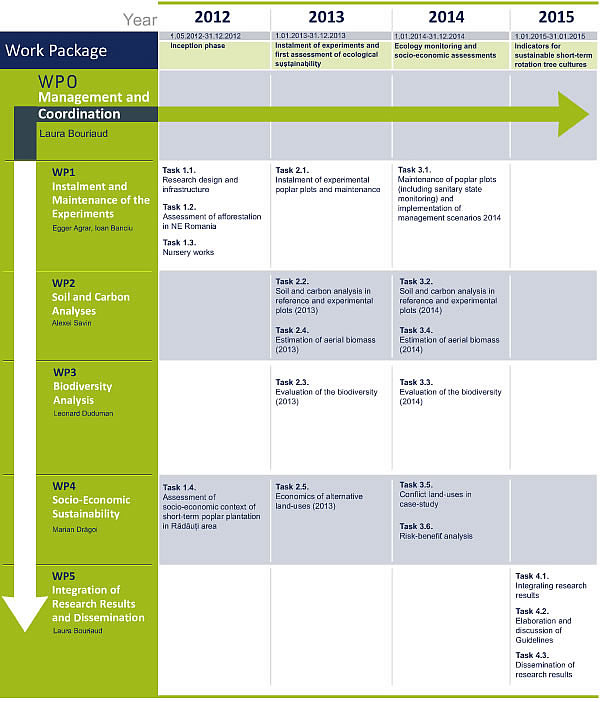| |
Title: Sustainability of short-term rotation cultures of trees on marginal lands
Acronym: STRoMA
Project number: PNII-PT-PCCA-2011-3.2-1574 / Contract number 119/2012
Funding Authority : Unitatea Executiva pentru Finantare a Invatamantului Superior, a Cercetării, Dezvoltării si Inovării (UEFISCDI)
Cofinancing: Egger Agrar (S.C. F.E. AGRAR S.R.L.)
Project duration: 20.07.2012 – 19.07.2015
Budget
Total budget: 932.960 lei,
Public funding: 792.760 lei;
Cofinancing funding: 140.200 lei
Contact person
Laura Bouriaud
bouriaud@usv.ro
13, Universitatii Street, 720229 Suceava,
Phone + 40 741101174
Project description
Romania has a large potential for afforestation of marginal lands. Short-term rotation plantations to provide industrial raw material (for energy, wood manufacturing, pulp, pharmaceutical, bio rafineries) is an innovative solution for multi-purpose land management and are likely to develop on large areas during the next decade as a market- and policy-driven process. The goal of this research project is to figure out and characterise wherein short-term rotation plantations can produce benefits to local communities and industry while minimizing the environmental risks. A wide range of studies are planned in the North-Eastern part of Romania to assess the social, economical and ecological sustainability of short term rotation cultures on marginal lands. Comprehensive soil analyses, measurements of greenhouse gas emissions and biomass production will be undertaken in reference versus cultivated plots, along with biodiversity assessments and socio-economic analysis. The analysis will also include for comparison alternative land uses, e.g. regular crops, pastures, abandoned land, recently cultivated lands with long-term forest plantations. Due to their fast-growth, poplar experiments will allow the implementation of three different management scenarios (intensive, moderate, minimal intervention) within the time frame of the project. In addition to the poplar experiment, an evaluation is proposed for newly afforestated lands in the NE area to identify plots with short-term plantations and assess the benefits and risks of such afforestation measures. The final target is to draw out Criteria for sustainable production of biomass with short-term rotation cultures with respect to protection of climate, environment and local communities needs. The results of the study, discussed with the relevant stakeholders, will be outlined in Guidelines of best practices in short term rotation cultures for industrial biomass production.
Project scope and objectives
The scope of this research project is to figure out and characterise wherein short-term rotation plantations on marginal lands can produce benefits to local communities and industry while minimizing the environmental risks.
The objectives of the proposal are:
- to assess the evolution of soil condition (nutrients, texture) during the plantation cycle, and compare it with alternative land uses;
- to assess the carbon balance of short-term plantations and to compare with alternative land uses;
- to evaluate and monitor the biodiversity of key-species in short-term plantation and alternative land uses;
- to assess the economics of competitive land uses and the benefits and risks for local communities;
- to establish and discuss with relevant stakeholders which may be the indicators and criteria for sustainable production of biomass with short-term rotation cultures with respect to protection of climate, environment and local communities needs.
Project management

|

















